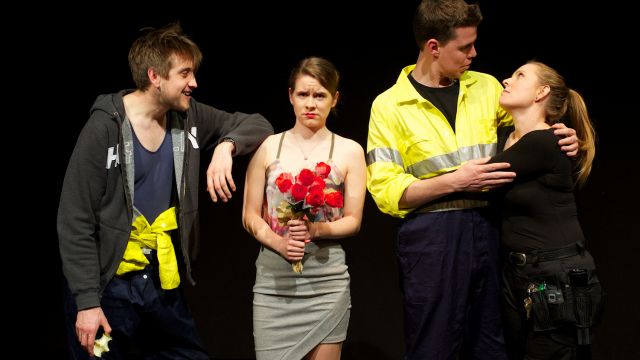Reasons To Be Pretty
American playwright, Neil LaBute, is a polarising “love him or hate him” talent – considered by some to be a witty commentator on the darker side of the human condition, dismissed by others as a glib misanthrope whose work is loaded with gratuitous “shock for shock’s sake” vulgarity. LaBute’s 2009 work Reasons To Be Pretty is as confronting, challenging and divisive a work as one would expect, given the man’s iconoclastic reputation.
Greg (Nic Krieg) is a quiet, bookish twentysomething stuck in a dead end job stacking shelves at a food warehouse, struggling to hold together a relationship with hypersensitive beautician, Steph (Clare Mansfield). When Greg casually remarks to a friend that he considers Steph’s features to be “regular”, rather than “pretty” or “beautiful”, Steph takes this as proof that he doesn’t really love her, flies into a rage and dumps him. This serves as the catalyst for Greg to re-examine the way he relates to people generally, specifically his best friend Kent (David Hirst) – an arrogant misogynist who is cheating on his loyal, emotionally insecure partner, Carly (Krystal Brock). When Greg finds out that Carly is pregnant, he must face up to the possibility that his easygoing, non-threatening demeanour has served to enable his friend’s cruel selfishness.
 The story is basically set up as a series of arguments between characters whose simmering, repressed emotions have reached boiling point. If you were to turn “Reasons To Be Pretty” into a drinking game, downing a shot every time a character let loose with a cluster of “f-bombs”, then you’d likely be unconscious within the first 15 minutes. Still, as shockingly profane as most of the dialogue is, there is a snappy, spitfire wit underlying it all, which is further enlivened by the fiercely impassioned performances.
The story is basically set up as a series of arguments between characters whose simmering, repressed emotions have reached boiling point. If you were to turn “Reasons To Be Pretty” into a drinking game, downing a shot every time a character let loose with a cluster of “f-bombs”, then you’d likely be unconscious within the first 15 minutes. Still, as shockingly profane as most of the dialogue is, there is a snappy, spitfire wit underlying it all, which is further enlivened by the fiercely impassioned performances.
Mansfield is frightfully tenacious as the neurotic Steph, but injects enough wounded vulnerability into her performance that the character doesn’t come across as a monstrous shrew. Brock, in a more subdued fashion, brings a similar depth of nuance to her depiction of a character that, in the hands of a lesser actress, could’ve come across as a one-dimensional nag. Hirst is impressively flamboyant as Kent, his goofball charisma making it seem plausible that the character would be so attractive, despite his toxic mistreatment of men and women alike. Krieg’s Greg is often positioned as the calm in the eye of the storm, but he has a nice line in deadpan snark and his body language speaks volumes, generally he makes for an endearing woobie.
As a story of four troubled individuals, “Reasons To Be Pretty” makes for a smashing black comedy, the laughter from the audience on opening night was both frequent and very loud. Unfortunately, the play flounders when it tries to make wider social commentary about male/female relations in the modern world. These moments come across as heavy-handed in their preachiness, and the characterisation is too extreme for these relationships to serve as a fair or reasonable reflection of broader gender conflicts . LaBute is often accused of sexism, and it’s not hard to see why, given the unpleasant depiction of women in this play. But it strikes this reviewer that he’s more of an “equal opportunity offender” – sure, both the female characters are neurotically oversensitive, but the males of the species are represented by a brutish egotist and a naïve wimp.
 Reasons To Be Pretty could’ve wound up being something of a miserable slog, but director Hartog paces the proceedings with screwball zest and Stephen Dean’s lighting transitions ensure that scene transitions are both swift and smooth. This American play has been “Australianised”, with the cast delivering dialogue in their native accents and the pop-culture references in the script have been replaced with local equivalents, which has the effect of making the verbal warfare between the characters more bracingly immediate to the audience.
Reasons To Be Pretty could’ve wound up being something of a miserable slog, but director Hartog paces the proceedings with screwball zest and Stephen Dean’s lighting transitions ensure that scene transitions are both swift and smooth. This American play has been “Australianised”, with the cast delivering dialogue in their native accents and the pop-culture references in the script have been replaced with local equivalents, which has the effect of making the verbal warfare between the characters more bracingly immediate to the audience.
Fans of Neil LaBute will likely be delighted by this technically accomplished presentation of his work, but LaBute haters probably won’t be won over by this production. Newbies are best advised to approach with caution… those who are in the mood for experiencing a confronting and challenging piece of theatre will get their money’s worth and then some from this. But those who are easily offended, or those who prefer to see plays that are focused upon likeable characters would do well to avoid this play.
Benjamin Orchard
Photographer: Michael Errey.
Subscribe to our E-Newsletter, buy our latest print edition or find a Performing Arts book at Book Nook.

